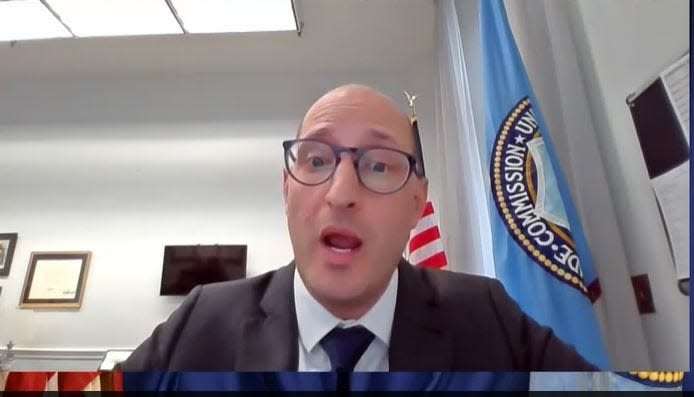Federal Trade Commission rejects pharmacy benefit managers probe pushed by Biden appointee

- Oops!Something went wrong.Please try again later.
The Federal Trade Commission rejected a proposed investigation Thursday of whether pharmacy benefit managers are violating federal anti-competitive regulations or other laws.
The four-member panel split 2-2 in a party-line vote, meaning the measure backed by chairperson Lina Kahn, appointed by President Joe Biden, was defeated.
The deadlock was a crushing blow to PBM critics nationwide who had long advocated for a deep federal probe of the shadowy middlemen in the drug supply chain. Just three PBMs control nearly 80% of the market, and they are now affiliated with health insurers, their own pharmacies, doctor's offices and other health-care entities to create what many say amount to both horizontal and vertical monopolies.
Corporations over consumers & small biz in today's @FTC 2-2 losing vote to probe PBMs. D-appointees @linakhanFTC & @RKSlaughterFTC took action; R-appointees @FTCPhillips & @CSWilsonFTC disregarded an hour+ of consumer & small biz pleas for FTC to act. https://t.co/W1y5UJ3gSG
— Douglas Hoey (@RPhDouglas) February 17, 2022
“Two members of the FTC just let the worst actors in the market off the hook," said National Community Pharmacists Association CEO B. Douglas Hoey. "After hearing hours of testimony by community pharmacists and patients, all of whom painted the same shocking picture about PBM abuse, and not a single witness there to defend the PBM industry, it is inexplicable that two members of the commission could vote against the study."
As the online meeting concluded, Kahn said, "I’m really disappointed by this outcome. ... I see this as an area where we have a real moral imperative as an agency to act.”

The other commissioner backing the probe, Democrat Rebecca Kelly Slaughter, remarked: “I think that is a shame for the American people.”
But the Republican duo voting against the study said they don't oppose looking into the role of PBMs, middlemen in the drug supply chain. They said the current plan was not comprehensive enough, and was only given to them around 9 p.m. Wednesday.

“I do not know what question the study is designed to study,” said commission member Noah Joshua Phillips.
He said the most-important function of such an undertaking should address why Americans' drug costs are so high.

Commissioner Christine S. Wilson said she wants a more data-driven approach.
"I support an FTC analysis of this industry,” she said. “If there’s anti-competitive conduct in the supply chain for prescription drugs, I want to know about it.”
The 2-2 deadlock was possible only because of a vacancy on the five-member commission. For a short period Democrats held a 3-2 edge, but member Rohit Chopra was picked by Biden to head the Consumer Financial Protection Bureau.
Biden nominated Georgetown University law professor Alvaro Bedoya in September to replace Chopit, but the Senate Commerce Committee deadlocked on that nomination in December and it expired. Biden resubmitted it last month but the Senate has yet to reconsider.

FTC: 'We don't make documents public'
Although the revised description of the proposed FTC probe was a key reason for its rejection, the public is not allowed to see it, a spokeswoman said after the meeting.
"I’m sorry but we don’t make documents public until they are approved by a Commission vote," said Betsy Lordan of the FTC's Office of Public Affairs.
According to the commission's agenda, the vote was on "whether to issue orders to large pharmacy benefits managers to study the competitive impact of contractual provisions, reimbursement adjustments, and other practices affecting drug prices, including those practices that may disadvantage independent or specialty pharmacies.
Greg Lopes, assistant vice president for strategic communications with the PBMs' trade group, the Pharmaceutical Care Management Association, said, “We look forward to working with Congress and the Administration on ways to increase affordability and access to prescription drug for all patients."

'Lives are literally at stake' because of PBM abuses, FTC is told
Thursday's non-decision decision came after pharmacists and others from across the country appeared at the virtual meeting to slam the conduct of PBMs.
"It is imperative to stop this dangerous PBM and insurer monopoly," testified Ted Okon, executive director of the Community Oncology Alliance. "Lives are literally at stake."
Just gave my two cents to the @FTC about #PBM adverse tactics harming #cancer patients and creating access issues for Americans as independent pharmacies are forced out of business by #PBMs. As I said in my remarks, “Lives are literally at stake.”
— Ted Okon (@TedOkonCOA) February 17, 2022
Okon said the vote shows how broken Washington has become.
"What a mess. Pharmacies going out of business and cancer patients can’t get needed drugs. Yet, the FTC fiddles while Rome burns. Very, very frustrating,' he tweeted.
David Balat, director of the Right on Healthcare Initiative at the Texas Policy Foundation, echoed the same sentiment.
"I’m utterly frustrated," he said. "Industry giants that function as pharmacy benefit managers have controlled the pharmaceutical supply chain and their representative markets for decades now and FTC Chair Lina Khan should be applauded for bringing this anticompetitive segment under review.
A split vote by the body tasked with mitigating anticompetitive behavior on whether to study anti competitive behavior of PBMs. What happened @FTC? https://t.co/sB0E6AQpkm
— David Balat (@DavidBalatHC) February 17, 2022
Scott Knoer, CEO of the American Pharmacists Association who testified during the hearing, said later, "Today was a swing and a very disappointing miss by the FTC. ... If the FTC really wants to score a win for patients and pharmacies, it should follow Chair Khan’s agenda, take action now, follow the data, and break them up!"
Okon's group released a report Thursday morning entitled PBM Dirty Tricks Expose.
"It is increasingly becoming clear that PBMs make up an oligopoly of rich, vertically integrated conglomerates that routinely prey on health care practices, providers, and their patients," said the study, prepared by boutique health-care law firm Frier Levitt of New Jersey.
"PBMs have done this by overwhelmingly abusing their responsibility to protect
Americans from this country’s drug pricing crisis, instead exploiting the opacity throughout the nation’s drug supply chain to enrich themselves."

PBMs 'take a sledgehammer to patients, to patient access to care'
A doctor who has treated AIDS patients since 1987, Michael Wohlfeiler, chief medical officer of the AIDS Healthcare Foundation in Los Angeles, told the FTC that PBMs have upset his organization's "world class model" to care for people with HIV.
"Outcomes are exceptional. Our pharmacist are experts in HIV," he said. "Over the last decade PBMs are a threat to effective models of care like ours and the health of vulnerable populations. PBMs dictate if they can stay with a pharmacy. This became abusive when PBMs started to merge with health plans and chain pharmacies to set up their own specialty pharmacies."

Greg Reybold, director of health care policy and general counsel for the American Pharmacy Cooperative based near Atlanta, told commissioners "There could not be a more important use of this agency's time, resources, and expertise, than investigating the practices of PBMs and their affiliate insurers."
He said those Fortune 15 corporations "take a sledgehammer to patients, to patient access to care and a sledgehammer to competition whether it's manipulating drug pricing, engaging in exclusionary rebate practices, inflating drug prices and clawing that money back to line their pockets, or steering some of this nation's sickest patients, including those with cancer and HIV, to PBM affiliate pharmacies against those patients' wills."
He also warned the agency of the stakes of investigating PBMs, which have enormous political and financial clout.
"I urge you to steel this agency's resolve, because you are going to be delving into practices of some of the largest companies in the world, opaque and complex pricing and steering schemes than likely this agency has ever seen — and that is saying something."
In the end, however, no steel was needed — the commission simply resolved to do nothing.
drowland@dispatch.com
@darreldrowland
Get more political analysis by listening to the Ohio Politics Explained podcast
This article originally appeared on The Columbus Dispatch: FTC declines to go after PBMs despite pharmacists' testimony

